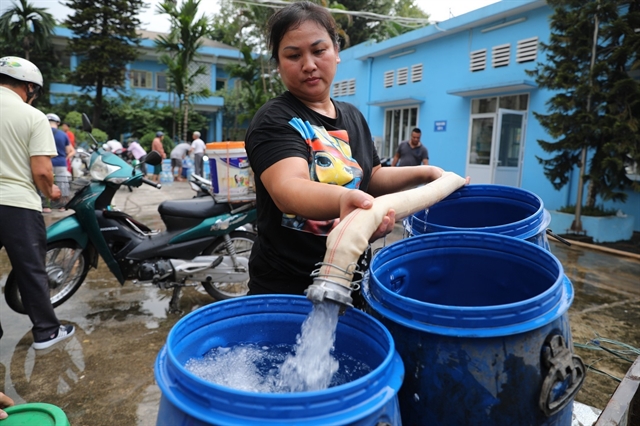.jfif) Opinion
Opinion

Việt Nam News speaks to experts about public service management and the need to enforce a law on public service management after the recent water crisis in Hà Nội.

|
| A Hà Nội's resident takes free water supplied by Hà Nội Clean Water Company after the water crisis happened in the capital city. VNA/VNS Photo Thành Đạt |
Việt Nam News speaks to experts about public service management and the need to enforce a law on public service management after the recent water crisis in Hà Nội.
Can you elaborate on the definition of public services? Is water considered public service? What is the role of State agencies in managing public services?
Dr Nguyễn Sĩ Dũng, public management expert, former vice chairman of National Assembly Office
The definition of public service is not clear in Việt Nam. In my opinion, anything provided to the public is considered to be public service. Water, electricity and other types of goods are all public services.
Whether the State directly offers the services or not, the authorities play an important role in investigating and managing the quality of the services. The authorities must be responsible for managing services provided by the private sector.
In the case of oil-contaminated water supplied by the Đà River Water Plant, thousands of residents have suffered the consequences, firstly from a shortage of clean water, then possible risks to their health once they consume polluted water. Is there any mechanism to protect the rights of residents in this case?
Lawyer Nguyễn Tiến Lập, arbitrator of Việt Nam International Arbitration Centre
The case has affected thousands of people. It is a crisis and I think there is a problem of public management in dealing with the crisis.
If we can not address public management problems, incidents like the one of Rạng Đông Light Source and Vacuum Flask JSC or Đà River Water Plant’s supply will continue to happen and residents are those who will suffer.
Talking about laws to protect customers’ rights, according to the law on the protection of consumers’ rights, customers can file a lawsuit against the service provider when the product creates harmful effects on them.
According to the law on public health, all relevant sectors must take responsibility for taking care of public health. Specifically in providing water, water suppliers have to ensure clean water is provided to the public. Otherwise, they will be punished in accordance with the law.
The supply of clean water and other public services are increasingly privatised. Many water supply companies in Hà Nội are private. How do you assess the management of public services provided by private firms?
Lawyer Nguyễn Tiến Lập
In other countries, privatisation is managed strictly by authorities. We must have clear conditions and clarify the responsibilities of the State because the people pay taxes to maintain public services.
In Hà Nội, the privatisation of public services is encouraged but there are no legal tools and regulations on that. Regulations on investment and on public-private partnership do not cover all sectors so they can not be the foundation to regulate a special and sensitive sector like public services.
Dr Nguyễn Sĩ Dũng
It is difficult to have a general assessment of all services. But in the case of Đà River Water Plant’s supply, the rules of public service provision are unclear. Therefore, the responsibilities of the State in public service management are not clear either.
How should we manage public services like water to ensure the rights of customers?
Dr Nguyễn Sĩ Dũng
It is necessary for the State to enforce a law on public service management. However, it will take a long time to propose, study and approve a law. In the meantime, we must apply regulations stated in law on protecting consumers’ rights, the law on public health and the law on public-private partnership (in case the private sector provides public services).
Once the law on public service management is applied, it must follow these principles.
First, it must ensure service supply is not interrupted. Water companies can't cut water supply in any case.
Secondly, the services must be equally accessible to the public.
Lastly, the service prices must be affordable to ensure accessibility. To do that, the State must get involved to ensure the prices are affordable. VNS




